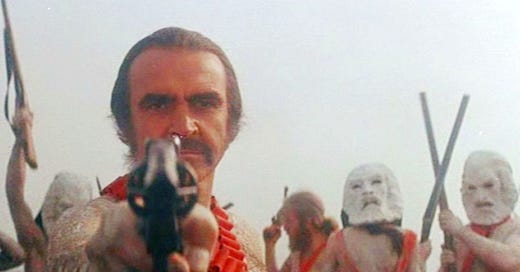In his recent review of Lifespan, Scott Alexander writes:
Algernon’s Law says there shouldn’t be easy gains in biology. Your body is the product of millions of years of evolution - it would be weird if some drug could make you stronger, faster, and smarter. Why didn’t the body just evolve to secrete that drug itself?
He is talking about anti-aging research, and wondering why, if there is an easy way to stop aging, humans haven't already evolved immortality spontaneously. There are many relevant things to say about this, but I think the evolutionary perspective is particularly interesting. Under some circumstances, it might be that immortality is inherently unstable.
The Imperium and the Horde
Suppose that it's the future, and the FDA just approved a pill that makes you immortal. Of course people disagree about whether one should take the pill or not. As a result, humanity is now divided in two populations: the Immortal Imperium, who took the immortality pill, and the Horde of Death, who still experience the painful decay and death we all know and love.
So, people from the Horde spend their time having plenty of children to populate the next generation, while people in the Immortal Imperium try to escape their existential ennui by reading speculative blog posts on the Internet. Who will prevail?
Two orders of fitness
There are two competing phenomena at play here. One is first-order selection, which is how many of your genes are passed on to the next generation, the more the better. For the Horde of Death, there is nothing mysterious: they reproduce, then they die, and an uncertain fraction of their genes gets passed on.
What about immortal people? They don't really pass anything to the next generation, because they don't do the whole generation thing. On the other hand, all of their genes will still be around centuries after centuries, so for the genes involved, this is a 100% success rate. In this sense, people in the Immortal Imperium have a very high first-order fitness.
The second process is second-order selection. This is selection on evolvability. This is about how easy it is for your lineage to improve its own first-order fitness in the future. If a lineage finds a way to evolve quicker, then it may eventually take over the whole population because it will be more likely to discover new beneficial variants, and the original mechanism that granted better evolvability will hitchhike with these new variants.
If you want to see it happen with your own eyes, look at Richard Lenski's long term evolution experiment, where people have been growing the same E. coli lineages continuously since 1988. Among the mutants that took over the population after a few thousands of generations, some were present since almost the very beginning. They are called EW, for Eventual Winners. Other mutants from the same period eventually disappeared, so they are called Eventual Losers (EL). Surprisingly, in the early days, the EL were able to grow faster than the EW. But in the long term, the EW did better. That is because the EW had mutations that made them more evolvable: they became more likely to acquire further beneficial mutations that ultimately made them grow faster than the EL. People in Lenski's lab replayed the competition over and over, and most of the time the more evolvable strain ended up taking over.
Second-order selection matters most for organisms that are not well-adapted to their environment. After all, if you are already at the top of the fitness landscape, there is no point improving your gradient-climbing abilities. Intuitively, it may look like humans are well-adapted to their environment, because we deliberately modified our environment to match our needs. But in a biological sense, current mortal humans are absolutely not well-adapted to their environment. In the First World, fertility is at an all-time low, yet we have all the resources we would need to have tons of offspring. In terms of sheer gene-copying, there is clearly a lot of room for improvement. In fact, there is a lot of genomic evidence that humans are currently under high selective pressure.
(Here is a fun way to think about it: consider that contraceptives are basically antibiotics for humans, in that they are chemicals that prevent us from reproducing. What do bacteria do when exposed to antibiotics for a long time? They evolve antibiotic resistance. So if someone gets a mutation that makes them resistant to contraceptives, they will have a fitness advantage. Realistically, we would quickly notice and switch to other contraceptives, so it's not likely to be a large issue. But what if people get mutations that increase their parental instinct instead?)
Will the Horde win in the long run?
While the Imperium has better first-order fitness, they are pretty bad at evolving. It is likely that they'll stop having children to avoid over-crowding. In that case, they just stop evolving completely.
Meanwhile, the Horde does a full cycle of variation/selection/reproduction every 30 years or so. This makes them pretty effective at discovering beneficial variants and become more adapted. To makes things worse, humans have a tendency to constantly change and remodel their own environment. This would explain why the rate of human evolution became higher in the last few thousands years: civilization is changing all the time. Our genomes are always adjusting to human-made changes in technology, environment, agriculture and social organization. The Horde would have no problem finding new genomes to stay up-to-date. The Imperium must do with the same old genomes they have had since the late 21st-century. For example, it's easy to imagine that the mortals can physically adapt to global warming, while the immortals will not have this chance.
If the Immortals do continue to have babies, their second-order fitness is still pretty bad: if the centuries-old generations still reproduce or mate with the newer generations, the average generation time is still much longer than the Horde's, so they still evolve slower, and it only gets worse as the population ages. Also, the original immortals still have to compete for resources with the younger, better-adapted immortals, so we are back to the problems we had with the Horde.
Cultural evolution
Anyways, genomic evolution is only one part of the picture. There is also cultural evolution, which is how cultures with higher fitness reproduce (or spread) faster, selecting for more adapted cultural norms. The main reason why humans are so good at colonizing everything is that cultural evolution is faster and more efficient than genetic evolution, so that's an important thing to have.
For the Horde of Death vs Immortal Imperium conflict, I am not sure who would benefit more from cultural evolution. On one hand, the Imperium has a lot of experience. They have seen everything and had plenty of time to discuss every problem. They have all read the Sequences. They have maximum wisdom.
On the other hand, the Horde gets fresh brains. We all know that young scientists and mathematicians tend to do the most groundbreaking discoveries, and that scientific fields tend to have booms in creativity following the death of established leaders. So what happens if they never die?
Here is a hint of evidence from tennis: when composite rackets were introduced, it altered the way people play in a subtle way, so that the previous way to play was no longer optimal. According to that one study, older players had trouble adapting to the new way to play, which favored younger players. I don't know how well it generalizes – at the very least, it implies that the Imperium would suck at tennis.
Another hint of evidence: moral values seem to be acquired at young age. When asked moral dilemmas (is it ok to eat the corpse of your pet after it was killed by a car?), people are more morally conservative when the question is asked in their native language, as opposed to another language they learned later in life. This suggests that some of our beliefs and values are shaped by the things we learn while our brains are still developing, and it is not clear whether that can ever be fully overwritten. Perhaps it will be much more difficult for the Imperium to update to new moral norms, which would hinder their cultural evolution. If the Overton window remains stuck in the same place, it would also hamper technological progress: at some point, the Immortals will see all the new gadgets the Horde constantly comes up with, and of course find them absolutely disgusting and immoral.
Elephants and mice
Altogether, it is hard to tell how humanity would continue its evolution if we discovered a way to immortality. There is a decent chance that an immortal population is inherently unstable, but there could also be cultural workarounds. One possible path that I didn't explore is that mortals and immortals end up occupying different ecological niches. Elephants are practically immortal compared to mice, yet both of them coexist without out-competing each other. If the Horde and the Imperium ever reach such an equilibrium, what would their respective niches look like?
One last quirk: what if the Immortal Imperium, in a last-resort strategy, decides to put immortality drugs in the Horde's drinking water? Then the Horde become immortal too, and lose their second-order advantage. Problem solved. Unless, of course, people start developing resistance to the immortality pills – such a mutation would be selected for because it helps selecting for mutations that help selecting for mutations that are beneficial. I have never heard of any third-order selection occurring in nature, but maybe humans will make it happen.






